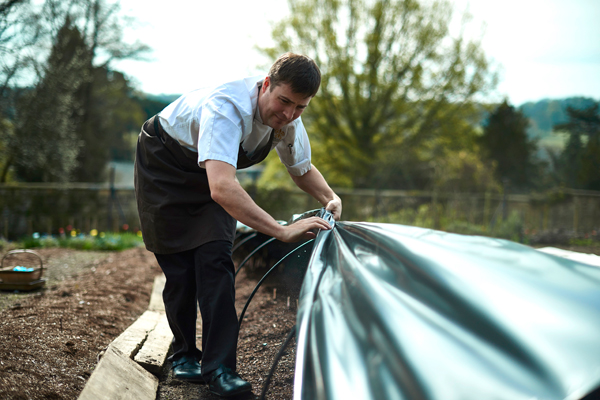How kitchen gardens are growing despite the drought
When the National Farmers' Union (NFU) gathered industry leaders, government officials and the secretary of state for the environment, food and rural affairs to a drought summit on 1 August, the group's president Minette Batters warned that many agricultural workers will have never seen such weather "in their lifetimes". The meeting was designed to be a wake-up call, not just to the government, but to the country: the nation's farms are in crisis.
A perfect storm of issues is threatening food security and farmers' livelihoods. The second hottest July and the driest start to summer since records began - on top of a shorter season caused by the long winter - has blighted staple crops at some farms. A shortage of migrant labour from the continent has left early ripening fruit rotting in fields. Delays in the Basic Payment Scheme and Country Stewardship payments, along with tight margins, have made expensive irrigation equipment harder to acquire and the risk of wildfires in the UK and Europe is increasing as the season continues, with the NFU reporting the death of a farmer in Devon as a result.
As for kitchens, James Wellock, managing director of supplier Wellocks, has warned that prices could soon skyrocket as farmers struggle to maintain their crops. "At the moment, people are ordering summer crops, so salads and berries, etc, and it's not really an issue for us right now. However, there will be significant issues with supplies of crops like carrots, parsnips, potatoes and cabbages as we move towards the autumn and over winter, and they will all be a lot more expensive."

n food security is strained in Britain, the answer has often been to turn to other European countries, but the whole continent is facing many of the same issues. Brendan Guinan, who runs In Season Farm in County Louth, Ireland, said that while his microveg business has been able to adapt, wholesale crops are set to face shortages.
"On veg farms the impact is quite serious and it's going to have huge implications this year and into 2019," he said. "I would imagine that in the next three to four weeks the pressure will really come on fresh produce. It's at a stage in the year where rain has come too late to make any real lasting effects on crops to help them to bulk up. Those growing salad crops may have some chance to get a decent crop of baby leaf salads and head lettuce as they have a shorter growing period, but the main staples are really in trouble - even the likes of leeks will be in short supply.
"I have spoken to many farmers in the main growing area of north Dublin and all are in the same boat. Kitchens and wholesalers are going to have to be prepared to pay extra this year.
"The problem has been that for years growers have been cut so tight on their margins they have had nothing extra left over to allow them to invest in important and expensive machinery for irrigation. This year, many small to medium-sized growers will be under pressure to stay in business and that's coming direct from their mouths."
However, some are turning the turbulent seasons to their advantage. Kitchen gardens have grown in popularity over the past decade as restaurants look to farm-to-plate practices to ensure they have control over high-quality produce. While it may be a movement designed around creating optimal flavours, it also provides an added layer of security to restaurants in periods of wholesale struggle.
At Gravetye Manor in West Hoathly, Sussex, head gardener Tom Coward brings two decades of experience to the one-Michelin-starred restaurant's 3.5-acre kitchen garden. He said the weather has helped him produce the restaurant's finest tomato crop and the best sweetcorn he has ever grown. He explained: "I've been doing this for 20 years… you can't change the weather, you can't change the wind or the tide but you can control your sail."
The team at Gravetye have been able to keep their crops well irrigated after drilling a borehole to siphon groundwater. "It's been a lot of work irrigating," Coward added, "but in this heat if you can get water to certain crops… God, they've grown."

t's a similar story for L'Enclume in Cartmel, Cumbria. The two-Michelin-starred restaurant's operations manager Sam Ward made it clear that the grounds from which they harvest their menu-guiding ingredients are not a "growing space" but "a proper farm". But unlike some much larger farms in the country, where skilled labour shortages have caused issues, L'Enclume has plenty of people to bring in the latest crop.
"If we need more bodies, we just turn around to the chefs and waiters and say, 'guys we need to get up there this afternoon, make sure you've got your mise en place done quick'", he said. "And this sounds really silly, but when you're used to spending your day doing one thing, whether it be in the office or in the restaurants, working hard in the kitchens or working hard on the floor, to go down to the farm and be told, right go plant a row of lettuce, it's quite a nice thing to do."
The farm at L'Enclume has equally experienced the joys of the sun, which balanced out the damage caused by the cold snap that fell across Britain during the start of the year. "Some of the plants froze, like some of the berries, but these things happen every year. Every year you've got to deal with birds, deer, butterflies, weather - everyone wants you to fail in nature, but we've prepared for it," Ward said.
"Did we have to do things differently this year? Yes. But that's farming."





